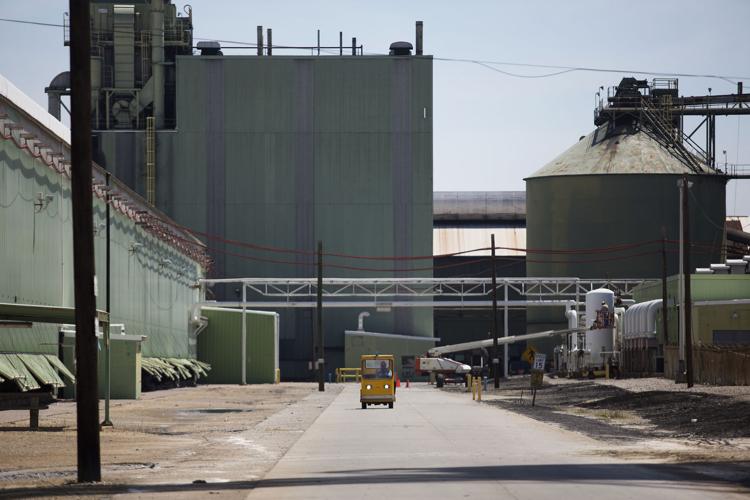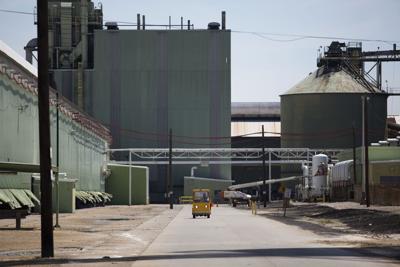A three-year power deal that Century Aluminum struck in 2021 with state-owed Santee Cooper is helping to protect the metal manufacturer's Mount Holly smelter near Goose Creek from rising energy costs.
That's good news for local workers as Chicago-based Century tries to navigate the escalating costs for electricity — the company's second-biggest expense behind payroll.
On June 22, Century announced it will idle its Hawesville, Ky., smelter for up to a year in the hopes that energy prices return to normal. The shutdown affects more than 600 workers in the Bluegrass State.
Century CEO Jesse Gary said power costs at the Hawesville smelter — the company's largest — tripled their historic averages in recent months.
Meanwhile, the plant off U.S. Highway 52 is still hiring and is in the midst of a roughly $100 million expansion that includes the restart of a second pot line by next year. To date, about a third of the 270 "pots" — large electrolytic cells where molten aluminum is made — that were idled in 2015 are back online, due in large part to the Santee Cooper contract, which stabilizes the smelter's power costs through 2023.
"The Hawesville plant was set up a little differently than Mount Holly — they buy their power day-to-day," said Dennis Harbath, manager of the Berkeley County operation.
What happened in Hawesville "is not going to impact Mount Holly whatsoever," he added.
That echoes Century's statement last month that "the company does not have any current plans to idle any other facility."
Moncks Corner-based Santee Cooper is providing power from excess capacity at the utility's Winyah Generating Station in Georgetown County. That will continue through 2023.
The Mount Holly site, which was at risk of shutting down due to power costs before inking the Santee Cooper deal, now employs 478 workers at the nation's newest and most modern smelter. The facility, which will operate at 75 percent capacity once the expansion is completed, will be able to produce 165,000 metric tons of aluminum ingot, billet and other products annually.
Harbath said the workforce "is still a little bit short of where we want it to be," with the goal of adding another 25 or so in the coming months.

A rendering shows the exterior of Volvo's training and technical center planned for Mahwah, New Jersey. Volvo Cars/Provided
Training daze
Volvo Cars broke ground last month in Mahwah, N.J., on an electric-vehicle training site for service technicians throughout the Americas, saying it will be the automaker's teaching hub for all of the U.S., Canada, Mexico and South America.
The center, to open in 2023, "will make North Jersey the center of Volvo’s EV training for the entire Western Hemisphere," Congressman Josh Gottheimer said during the ceremony.
So, where does that leave the training center Volvo opened next to its Ridgeville plant in 2021? Volvo Car University — built with taxpayer dollars to lure Volvo to the Lowcountry — was supposed to be the automaker's central EV training site throughout the Americas.
The answer isn't entirely clear.
When asked about the similarities and whether the Garden State center would duplicate or replace any of the South Carolina site's offerings, Volvo spokesman Russell Datz replied in an email: "The new Mahwah facility will complement the Ridgeville location to ensure we can give all our retailer service technicians the necessary training in a timely manner."
There was no mention of the Ridgeville training center in a news announcement Volvo issued after the New Jersey groundbreaking. And the automaker isn't explaining how two sites hundreds of miles apart can both be the central training point for Volvo technicians from the Yukon to Uruguay.
But if Volvo intends to operate two separate training hubs for the Americas, attendees will now have a choice: the industrial landscape of northern Jersey and its scenic turnpike or the Lowcountry's beaches, hospitality and world-class restaurants.
Port apportions
The State Ports Authority, the maritime agency that runs the Port of Charleston, is accepting applications for its Community Giving Program, which awards grants to nonprofits and other groups serving the areas where it operates.
Applicants must have one of the following primary objectives: maritime commerce, economic development, environmental awareness or community outreach. Programs with measurable, sustained impacts receive priority during the selection process.
In fiscal 2022, the SPA awarded $205,000 in grants to 111 organizations and nonprofits throughout South Carolina.
Applications must be submitted electronically via the online form available at tinyurl.com/53d4z7tm. The deadline for applications is 5 p.m. on July 29.













